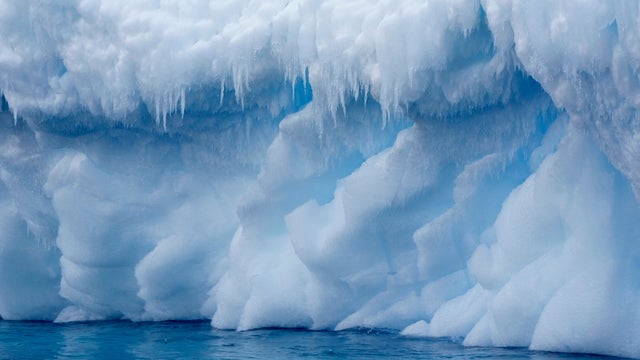Abrupt Antarctic climate shifts could lead to "catastrophic consequences for generations," experts warn
Posted by SleekNews
Thu, August 21, 2025 4:08pm

Abrupt and potentially irreversible changes in Antarctica driven by climate change could lift global oceans by meters and lead to "catastrophic consequences for generations," scientists warned Wednesday.
More broadly, a state-of-knowledge review by a score of top experts revealed accelerating shifts across the region that are often both a cause and effect of global warming, according to a study published in Nature, a peer-reviewed international scientific journal.
The study's authors suggest that limiting CO2 emissions, and in turn preventing global warming from exceeding at least 1.5 degrees Celsius, "will be imperative" to reduce and prepare for the broad effects of abrupt Antarctic and Southern Ocean changes.
"Antarctica is showing worrying signs of rapid change across its ice, ocean and ecosystems," lead author and Australian National University professor Nerilie Abram told the Agence France-Presse. "Some of these abrupt changes will be difficult to stop."
Shifts in different facets of Antarctica's climate system amplify each other and have accelerated the pace of warming globally as well, Abram said.
The study looked at evidence of abrupt change — or "regime shifts" — in sea ice, regional ocean currents, the continent's ice sheet and ice shelves, and marine life. It also examined how they interact.
Floating sea ice does not significantly add to sea level when it melts, but its retreat does replace white surfaces that reflect almost all of the sun's energy back into space with deep blue water, which absorbs the same amount instead.
Ninety percent of the heat generated by manmade global warming is soaked up by oceans.
Retreating sea ice
After increasing slightly during the first 35 years that satellite data was available, Antarctic sea ice cover plunged dramatically over the last decade.
Since 2014, sea ice has retreated on average 120 kilometers, or roughly 75 miles, from the continent's shoreline. That contraction has happened about three times faster in 10 years than the decline in Arctic sea ice over nearly 50.
By July 2025, daily sea ice extent in both hemispheres was at its third lowest in the 47-year satellite record, according to the National Snow and Ice Data Center at the University of Colorado Boulder.
Data from NASA, released in 2020, indicated that Antarctica and Greenland had lost thousands of gigatons of ice between 2003 and 2019, indirectly contributing to more than half an inch of overall sea level rise around the world.
Last September, scientists warned that the Antarctic Ice Sheet, officially called the Thwaites Glacier, would deteriorate "further and faster," with the increased melting expected to trigger rising sea levels. Research conducted by the International Thwaites Glacier Collaboration, a collective of more than 100 scientists, found that the volume of water flowing into the sea from the Thwaites glacier and others nearby had doubled from the 1990s to the 2010s.
The "overwhelming evidence of a regime shift in sea ice" means that, on current trends, Antarctica could essentially become ice free in summer sooner than the Arctic, the recent study published Wednesday in Nature found.
This will speed up warming in the region and beyond, and could push some marine species toward extinction, experts warned.
Over the last two years, for example, helpless emperor penguin chicks perished at multiple breeding grounds, drowning or freezing to death when sea ice gave way earlier than usual under their tiny feet.
Of five sites monitored in the Bellingshausen Sea region in 2023, all but one experienced a 100% loss of chicks, earlier research reported.
Unlike sea ice, ice sheets and the ice shelves to which they are connected are on — or supported by — land.
The world would need to heat up by 5 degrees Celsius compared with pre-industrial levels to melt the entire Antarctic ice sheet, which would lift global oceans an almost unimaginable 58 meters, or nearly 200 feet.
Point of no return
Global warming to date — on average about 1.3 degrees Celsius — is fast approaching a threshold that would cause part of the ice sheet to generate at least three meters of sea level rise, flooding coastal areas inhabited today by hundreds of millions, the study said.
"Unstoppable collapse of the West Antarctic Ice Sheet is one of the most concerning global tipping points," said Abram.
"The evidence points to this being triggered at global warming well below 2°C."
Another potential risk is the collapse of the Antarctic Overturning Circulation, a system of ocean currents that distribute heat and nutrients within the the region and globally.
A "rapid and substantial slowdown" of the currents has already begun, and evidence from the previous interglacial period — between two ice ages — before our own, 125,000 years ago, points to an abrupt stagnation of the system under conditions similar to those seen today.
"This would lead to widespread climate and ecosystem impacts," ranging from an intensification of global warming to a decrease in the ocean's capacity to absorb CO2, the study reported.
Ultimately, the only way to slow down the interlocking changes is to stop adding more planet-warming gases into the atmosphere.
"The greenhouse gas emission decisions that we make over the coming decade or two will lock in how much ice we will lose and how quickly it will be lost," Abram said
Source
|









